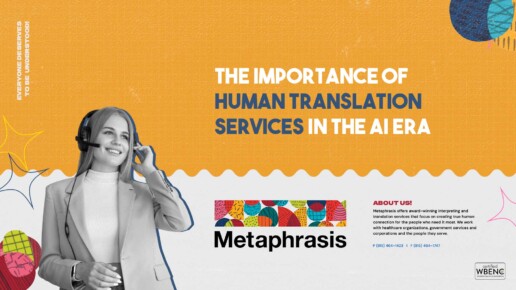Importance of Human Translation Services in the AI Era?
In an age where artificial intelligence seems to be transforming every facet of our lives, it’s easy to assume that machine translation tools like Google Translate or DeepL can handle all language needs. But here’s the truth: while AI-powered translations can be fast and convenient, they still can’t match the accuracy, nuance, and cultural sensitivity that come from a real human being. Language is complex—full of idioms, context, tone, and emotion—and that’s where human translation services truly shine. Let’s explore why human translators are still irreplaceable in the AI era, especially with expert providers like Metaphrasis.
Why Choose Human Translation Services?
So, what makes human translators so vital? First off, humans understand context. Machines might get the literal meaning of a sentence, but they often miss the intent. Take the phrase “break a leg.” A machine might translate it as a literal injury, while a human translator knows it’s a theatrical way of wishing someone good luck.
Then there’s the emotional tone—something only a human can grasp fully. If your message needs to be heartfelt, persuasive, or humorous, only a skilled human translator can ensure that sentiment carries through in another language.
Also, cultural sensitivity is crucial. A machine can’t catch cultural taboos, slang, or offensive phrasing. A human, however, understands not just the language, but also the culture behind it. That means your message won’t just be translated—it’ll be localized, making it resonate with your target audience.
At Metaphrasis, human translators are trained not just in languages, but in specific industries like healthcare, law, education, and business. That ensures terminology is spot-on, and nothing gets lost in translation.
The Translation Process
Human translation is not just about swapping one word for another. It’s a detailed, step-by-step process that ensures precision, fluency, and cultural fit. Here’s how a professional translation project typically works:
- Project Analysis – Understanding the client’s goals, audience, and content type. Are we translating a legal contract, a medical report, or a marketing brochure? Each one needs a different approach.
- Translator Assignment – Matching the project with a translator who is not just fluent, but also experienced in the subject matter.
- Translation – The translator works through the document, taking care to preserve tone, intent, and accuracy.
- Editing and Proofreading – A second linguist reviews the translation for grammar, style, and accuracy.
- Final Review and Delivery – Quality assurance teams ensure everything meets the highest standards before delivering the final product.
Unlike AI tools that skip editing, this multi-layered process ensures quality that machines simply can’t replicate.
The Role of Professional Translation Services
Professional translation services are about more than just language—they’re about communication. In business, one mistranslated phrase could lead to lost contracts or legal risks. In healthcare, a misunderstood instruction could even cost a life. That’s why it’s crucial to use a trusted provider like Metaphrasis, who understands the stakes and delivers nothing less than excellence.
Professional services also bring confidentiality. Whether it’s a business deal or a medical file, sensitive documents need secure handling. Reputable firms use encrypted platforms and confidentiality agreements to keep your information safe—something free online tools just can’t guarantee.
Moreover, translation companies often provide certified translations for legal or immigration purposes. These are official documents with legal standing—something AI simply can’t offer.
Human vs. Machine Translation
While machine translation has its place, especially for quick and informal translations, it falls short in many professional settings. Human translation provides:
- Nuanced Translations: Machines often miss the subtleties of language, leading to errors. Human translators understand idioms, humor, and cultural references.
- Quality of Work: Professional human translators deliver superior quality, ensuring that the translation is not only accurate but also readable and engaging.
- Reliability: Human translation is unmatched in reliability for critical documents such as birth certificates or legal contracts.
Choosing the Right Translation Service
Not all translation providers are created equal. When selecting a service, you need more than just bilingual ability—you need expertise, integrity, and professionalism. Look for a company that:
- Uses native speakers
- Has industry-specific expertise
- Follows a rigorous review process
- Offers certified translations
- Prioritizes client confidentiality
Metaphrasis checks all these boxes. With a network of qualified linguists and subject matter experts, they deliver translations that are clear, accurate, and culturally appropriate. Whether you need a court interpreter, multilingual training materials, or a medical document translated, Metaphrasis has the human touch that AI can’t replicate.
Conclusion
AI is evolving fast—but when it comes to language, humans still lead the way. Human translation services offer nuance, emotion, and cultural understanding that no algorithm can match. In legal, medical, educational, or business settings, one mistranslation can cause huge consequences.
Ready to experience the benefits of professional human translation services? Contact Metaphrasis Language & Cultural Solutions, LLC. today for a quote and let our expert linguists handle your translation needs with precision and care.

